Ripe blackberries are a great summer treat... and they make a fantastic wine! Here's my Homemade Blackberry Wine Recipe - A bit of work, but worth it!
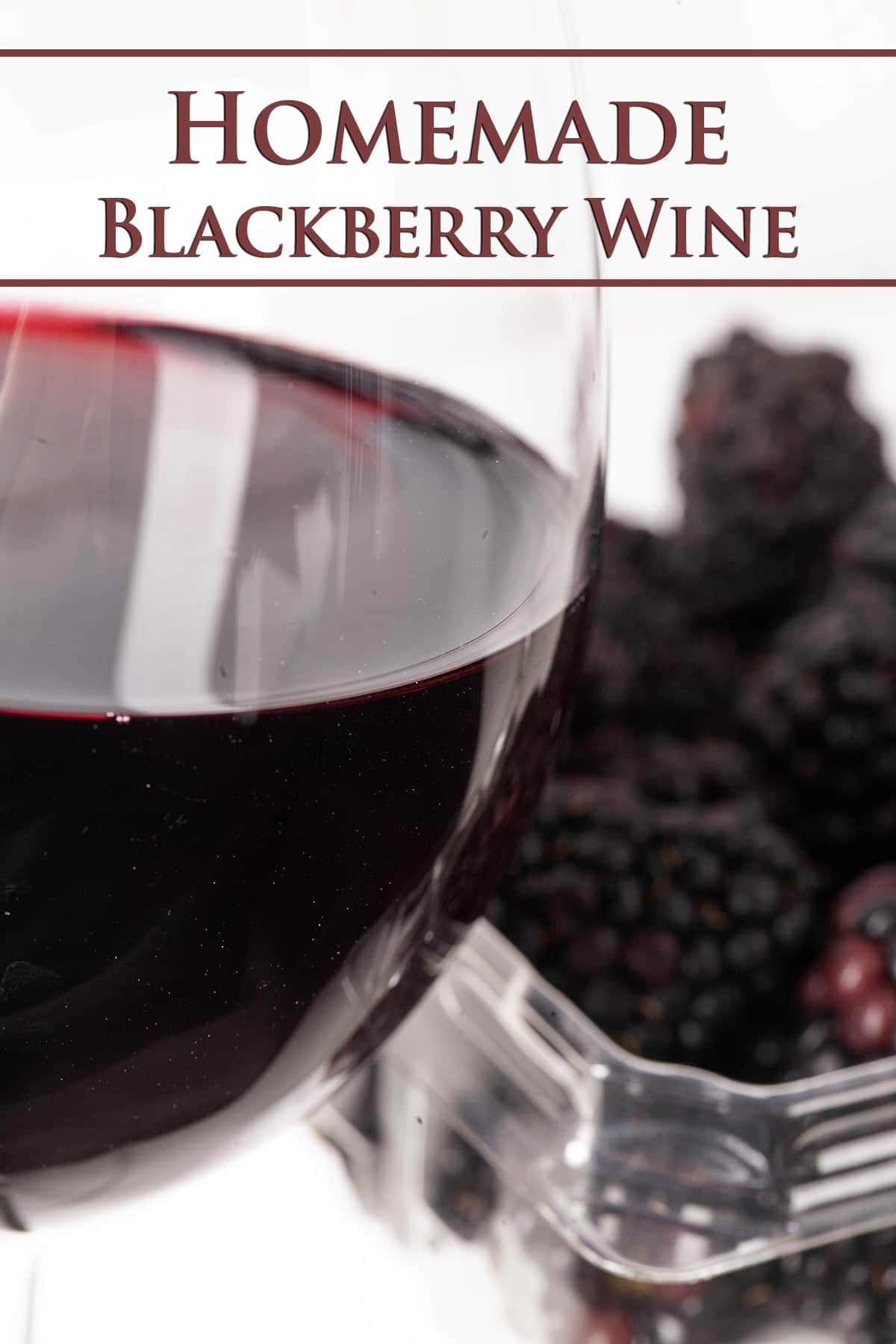
Two wine recipes in as many weeks! Well, get used to it for the next while - I've been digging through all of my wine notes, and pulled out a bunch to blog!
Until recently, we haven't really done any wine making in several years. We sold off most of our equipment - and gave away our huge collection of homemade wine - before we moved back to Canada a couple years ago.
Also, as we'd known we would be moving, we stopped making wine a few years before the move. As it takes a year or so to make, it didn't make a lot of sense to keep increasing the size of our collection, after all!
Before we moved, however, we made a TON of wine. Far more than we would have ever been able to drink, but hey - it was a fun activity to do together, and it makes a great gift!
Some of the recipes we'd developed back then have been some of the most popular recipes on this blog. Watermelon Wine and Banana Wine in particular are usually in our top 3 posts, with Mango Wine being not far behind!
Anyway, we recently re-purchased some equipment to go back to making SMALL batches of wine. We don't know enough people here to justify making 5-6 gallon batches anymore, and - frankly - the pandemic situation is not making us want to expand our meager social circle!
But hey, at least we'll have wine on hand, right?
Anyway, you can expect a new wine recipe every week for the next couple of months, at the very least. That'll get me past the bulk of the backlog, and give you a ton of variety to play with!

How to Make Blackberry Wine
If you haven't attempted making wine before, don't be intimidated! Check out our 3 part primer to home brewing:
- Wine Making at Home Part 1: Why
- Wine Making at Home Part 2: Equipment to Get Started
- Wine Making at Home Part 3: The Brewing Process
- Wine Making at Home, Part 4: How to Stabilize and Back Sweeten Wine
Just a small handful of entries, and you'll be good to go!
Blackberry Wine Ingredients
This wine recipe requires only a few ingredients to make - super simple! Here is some information about those base ingredients that you may find helpful.
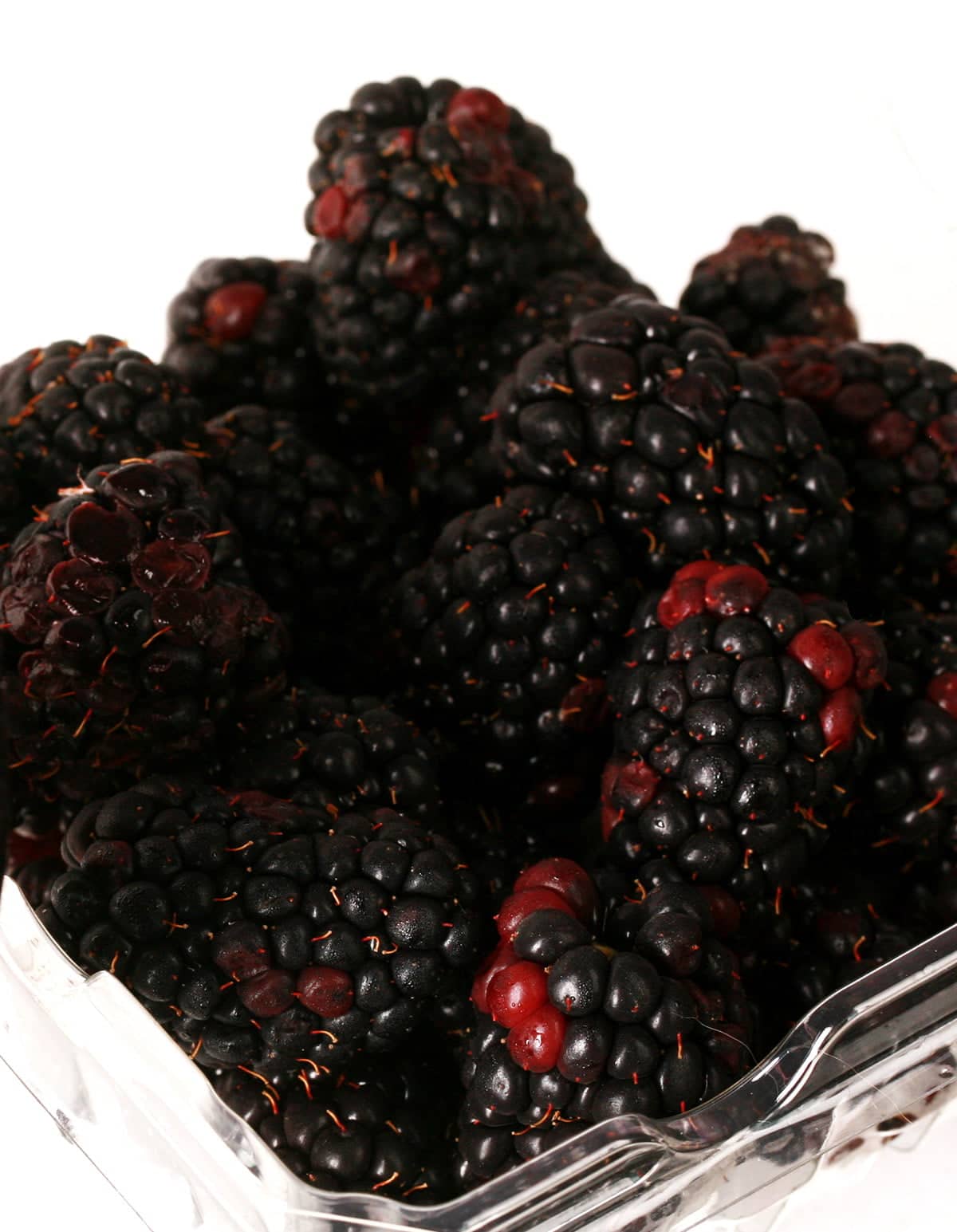
Blackberries
You can use fresh or frozen blackberries to make this wine. There are just a few differences in how to use them, and things to keep in mind:
Fresh Blackberries
When using fresh blackberries, be sure to use ripe berries, and pick through to remove anything that's not ripe, is moldy, etc.
I like to whirl the blackberries in the food processor to break them up a bit, and let them sit in the sugar for a bit before starting on the wine making, as this process - maceration - draws the juices out of the berries.
It isn’t totally necessary, but I enjoy it. There’s something satisfying about seeing the juices pool around the fruit early on, rather than waiting for the brewing process to draw them out!
Frozen Blackberries
When using frozen blackberries, you can skip the maceration process. Freezing and thawing the berries breaks them down in a way that ends up with a result similar to maceration.
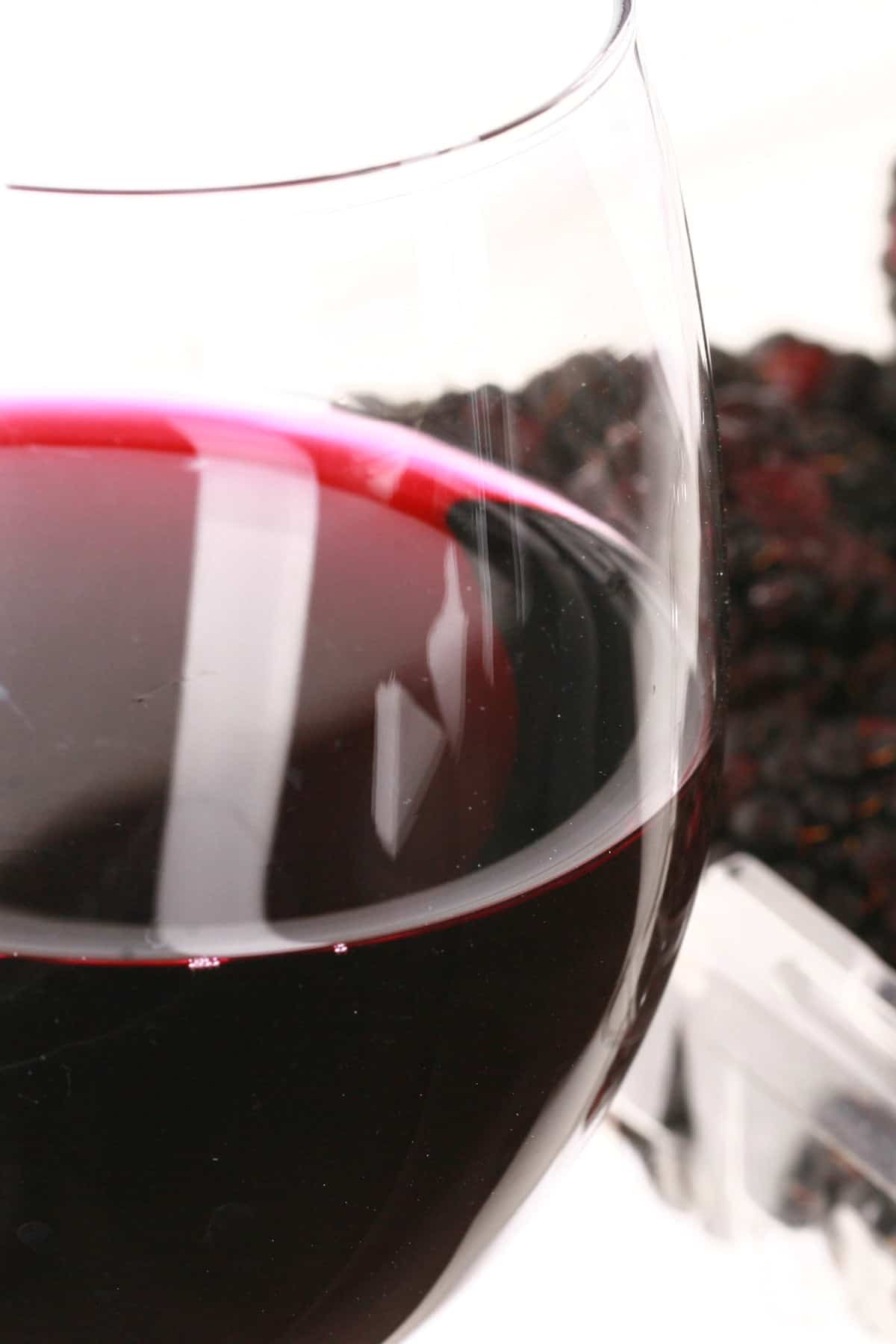
Sugar
While sugar is technically optional when making wine, NOT adding any sugar will result in an INCREDIBLY dry wine.
Sweet tooth aside, I find that pretty much any fermented fruit /fruit juice beverage (wine, mead, cider) just tastes better when there’s some degree of sweetness there. It really brings out the fruit flavour.
When it comes to the darker fruit wines - this, my blueberry wine, etc - it IS ok to let them go dry, if that’s more to your taste.
As a general rule of thumb, the lighter coloured wines (Mango, watermelon, strawberry, etc) don’t really taste like anything if they aren’t sweet.
Type of Sugar
In terms of type of sugar, we prefer to use plain white granulated sugar for this wine.
If you’d like to substitute honey for the sugar (we usually just swap it out 1:1 by weight), you will brew a nice blackberry mead
Alcohol Content
When it comes to sugar, flavour isn’t the only consideration - there’s the matter of alcohol content.
Your wine’s final ABV will vary wildly dependent on a few things: The initial sugar content of the blackberries you use (which can vary!), how much sugar you add, and what kind of yeast you use (more on that in a bit)
Any amount of sugar will result in a higher alcohol content. Sugar - both in the base wine itself, and from the added sugars - is what feeds the yeast, the yeast eats up the sugars and gives off alcohol as the byproduct of that process.
More sugar = more food = more alcohol... to a point, anyway. About that...

Yeast
The type of yeast you use will impact the alcohol content of the final product.
Yeast organisms don’t have an *unlimited* capacity to process sugar into alcohol. At some point, the environment they’re living in - the brewing wine - becomes too high in alcohol for the yeast to survive. They die off, the fermentation stops.
Different types of yeast have different tolerances for alcohol in the environment. That is, some yeast will be able to survive higher amounts of alcohol in the wine, so they’ll continue producing it longer than some other types.
Some types of yeast will bring you to something like an 8% ABV, while others will let things run wild until close to 20% ABV.
It’s good to know what you have in mind, when you choose your yeast.
If you want a sweet wine with a low-ish ABV - without having to back sweeten it (more on that in a bit) - choose a yeast with a lower tolerance for alcohol.
If you’re looking for a dry wine with a low ABV, choose a yeast with a lower tolerance for alcohol, and don’t use a ton of sugar.
If you want a sweet wine with a high ABV, use a bunch of sugar with a high-tolerance yeast... and be prepared to backsweeten it.
If you want a dry wine with a high ABV, use a fair amount of sugar and a high tolerance yeast.
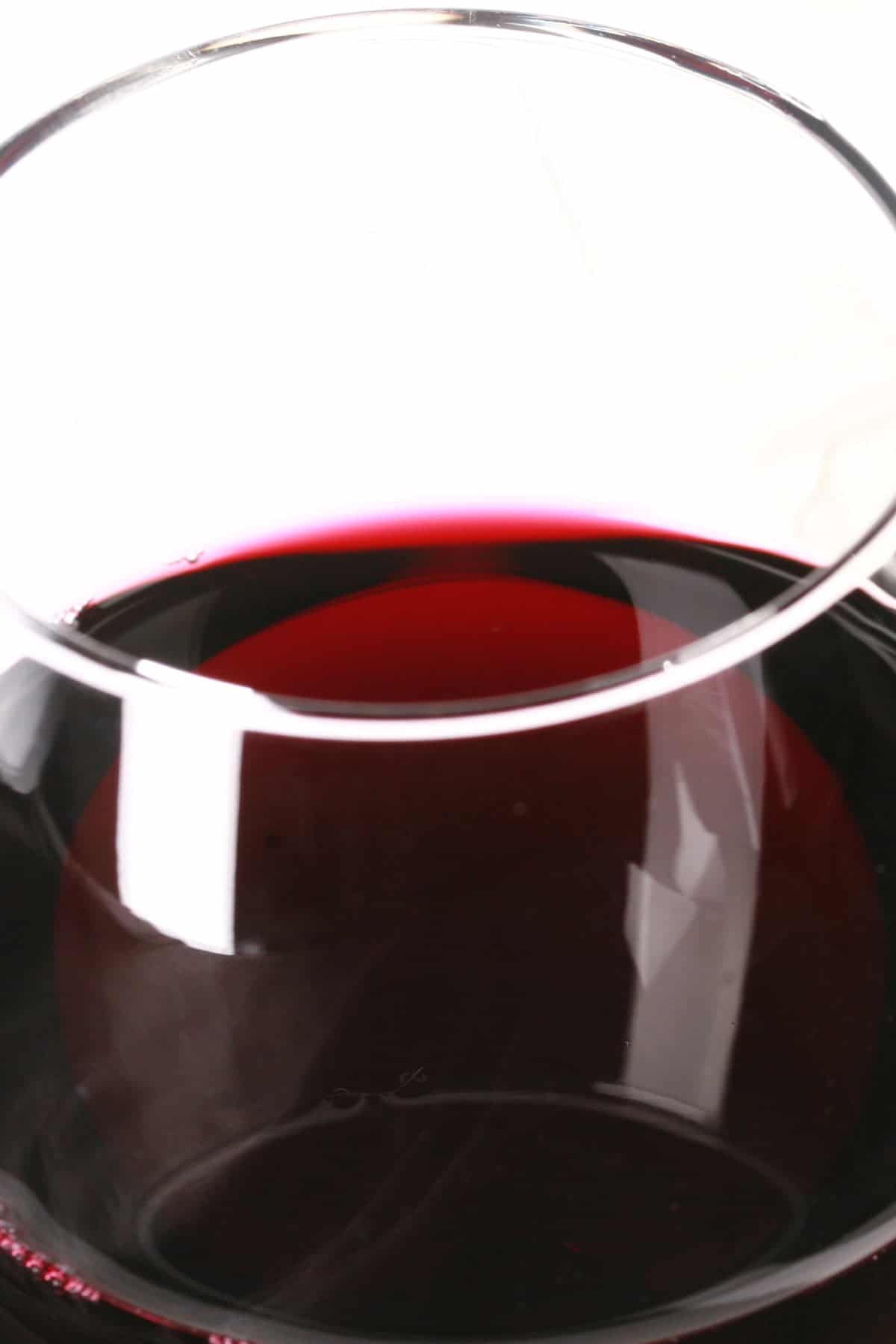
Back Sweetening Your Homemade Blackberry Wine
Sometimes, you’ll find that the yeast went a bit too far, and you end up with a Blackberry wine that’s not as sweet as you’d like it.
... and that’s when you back sweeten it! You can read my How to Stabilize and Back Sweeten Wine post for information on how to back sweeten it.
More Home Brewing Recipes!
While you've got your current homebrew fermenting away, why not consider putting a batch of something else on, to occupy your wait time? Here are a few of my other wine, cider, and mead recipes:
Wine Recipes
Banana Wine Recipe
Blackcurrant Wine Recipe
Blueberry Wine Recipe
Cherry Wine Recipe
Cranberry Clementine Christmas Wine Recipe
Cranberry Wine Recipe
Faux Lingonberry Wine
Lychee Wine Recipe
Mango Strawberry Wine Recipe
Mango Wine Recipe
Mint Wine Recipe
Lychee Wine Recipe
Partridgeberry Wine Recipe
Passionfruit Wine Recipe
Peach Wine Recipe
Stone Fruit Wine Recipe
Strawberry Wine Recipe
Ube Wine Recipe
Watermelon Wine Recipe
Mead Recipes
Black Cherry Mead Recipe
Blueberry-Clementine Mead Recipe
Blueberry Mead Recipe
Clementine Mead Recipe
Pumpkin Mead Recipe
Wildflower Mead Recipe
Cider & Miscellaneous Homebrew Recipes
Hard Apple Cider Recipe
Home Brew Hard Iced Tea Recipe
Maple Hard Apple Cider Recipe

Share the Love!
Before you drink up, be sure to take some pics of your handiwork! If you post it to Bluesky, be sure to tag us - @CelebrationGen. We're also on Pinterest, so you can save all your favourite recipes to a board!
Also, be sure to subscribe to my free monthly email newsletter, so you never miss out on any of my nonsense.
Well, the published nonsense, anyway!
ANYWAY. Let's get to that recipe, shall we? The sooner you get on it, the sooner you'll be able to enjoy some Homemade Blackberry Wine of your own!
Homemade Blackberry Wine
Equipment
- 2 gallon fermenter bucket and lid
- 1 air lock and stopper
- Siphon, siphon tubing.
- 1 - 2 1 gallon glass carboys
Ingredients
- 4 lbs fresh ripe blackberries
- 3.5 lbs white sugar
- 1 gallon spring water
- ½ teaspoon acid blend
- ½ teaspoon pectic enzyme
- 1 teaspoon yeast nutrient
- 1 packet Red Star “Montrachet” yeast
- Wine stabilizer of choice optional
Instructions
- Rinse and pick through blackberries, removing any that are moldy, etc.
- Place in a large pot, along with the sugar. Using a potato masher or VERY clean hands, stir and mash blackberries.
- Add water, stir well. Heat to ALMOST boiling, then simmer gently for 30 minutes. Stir in acid blend, enzyme, & nutrient.
- Pour mixture into a freshly sanitized fermenting bucket. Cover with sanitized lid and air lock, allow to cool to room temperature (overnight).
- The next morning, give the mixture a quick stir with a long, sanitized spoon, and – using sanitized equipment – take a gravity reading of the liquid (strain out any blackberry pulp). Keep track of the number! (This is an optional step, but will allow you to calculate your final ABV %)
- Sprinkle yeast into fermenter, cover with sanitized cover and air lock. Within 48 hours, you should notice fermentation activity – bubbles in the airlock, carbonation and /or swirling in the wine must. This means you’re good to go!
- After a week or so, use your sanitized siphon setup to rack the must into a freshly sanitized carboy. Put the carboy somewhere cool (not cold!), and leave it alone for a month or so.
- Using sanitized equipment, rack the wine off the sediment, into a clean, freshly sanitized carboy. Cap with sanitized airlock, leave it alone for another 2-3 months.
- Rack one more time, leave it for another 3 months or so.
- When your wine has been racked a few times and shows NO more fermenting activity for a month or so (no bubbles in the airlock, no more sediment being produced, you can move on to bottling. **
- If stabilizing, follow the instructions on your selected type of wine stabilizer to stop fermentation. For potassium sorbate, this needs to be done 2-3 days before bottling.
- Using sanitized equipment, take a gravity reading, then rack the wine into clean, sanitized bottles. Cork.
Notes
Nutrition

Combining liqueurs with more traditional baking ingredients can yield spectacular results.Try Mango Mojito Upside Down Cake, Candy Apple Flan, Jalapeno Beer Peanut Brittle, Lynchburg Lemonade Cupcakes, Pina Colada Rum Cake, Strawberry Daiquiri Chiffon Pie, and so much more.
To further add to your creative possibilities, the first chapter teaches how to infuse spirits to make both basic and cream liqueurs, as well as home made flavor extracts! This book contains over 160 easy to make recipes, with variation suggestions to help create hundreds more! Order your hard copy here on my website, through Amazon, or through any major bookseller.


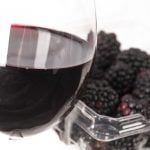
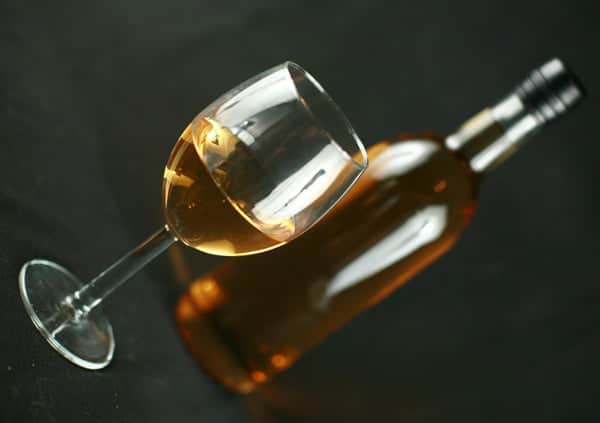
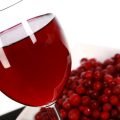


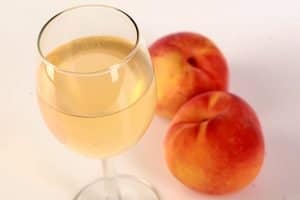

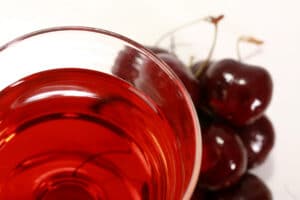
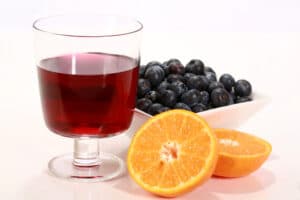
Kirsten
So, if I want to use frozen blackberries, how much do I need? Do I follow all of the instructions just the same way? Earlier it says to skip the maceration process. Thank you.
Marie Porter
You use the same amount of berries.
You skip the maceration process and just put it all in the pot and got from there.
Amie
My blackberry wine seems to be done fermenting before the first month. I racked it into the second carboy (step 8). The alcohol content is about 15%. (1.102 - 0.986 * 131.25)
Should I have added something to get it to ferment longer?
The flavor seem a bit "alcoholly"...but it's not horrible. It smells great 🙂
Should I just let it sit for the 2-3 months like recommended in step 8, for settling? And another 3 month like recommended in step 9? Any suggestions would be great 🙂
Marie Porter
Yes, definitely let it sit / rack it as noted. The racking can set off more fermentation, and the sitting will smooth out that alcohol smell.
Megan Caiella
At what step do I put the sugar in?
Marie Porter
2
michelle
Hi, I've currently making your blackberry wine recipe and peach wine recipe. When it's time to stabilize after fermentation, do you personally use potassium sorbate and metabisulfite or just the potassium sorbate? Thank you,
Marie Porter
Personally, we end up mailing it in, not doing either, and just hoping that we don't end up with bottle bombs after we backsweeten them!
Kevin White
What do you mean, when you say "Bottle Bombs?"
Marie Porter
If fermentation hasn't actually stopped, the bottles of wine will become pressurized and can explode.
Nina Kern
I have fresh and frozen blackberries, I will freeze the berries I just picked as well as anymore that I will pick. Also can I use my Lalvin wine yeast for this wine?
Marie Porter
Definitely!
Roger Hayes
Hi Marie,
Do you actually have any recipes for blackberry and mango wine making please?
Marie Porter
Well you posted this on the blackberry wine recipe, so yes!
The mango wine recipe is here: https://celebrationgeneration.com/homemade-mango-wine-recipe/
Westy
Hi,
Can you confirm all the blackberry pulp is to be removed at stage 5. Bit confused as you refer to the must in stage 6 @ 7
Thanks
Marie Porter
No, the blackberries stay in the fermenter until the first racking. You just want to strain any pulp out of the liquid you use to take the gravity reading.
DavidO
Hi, Marie,
How about a link to a seller of carboys? Whatever they are.
Marie Porter
Hi!
Carboys are the big glass bottles that secondary fermentation happens in. There's a link to my post about equipment early on in this post, and there's a photo and link to buy them in the equipment section of the recipe card at the bottom of this post.
Jules
Hi there,
If I make this now, in August, can we drink it for Christmas?
And if that’s too soon, is there a recipe that only takes 3 or 4 months until it’s ready?
Many thanks
Marie Porter
I wouldn't recommend drinking any berry wine at 3 or 4 months - it's not a recipe issue, it's a matter of the time needed for the fermentation and clarification. 3-4 months will taste like yeasty jet fuel, no matter the recipe.
Jocelyn
I haven’t tried this recipe yet, or any for that matter. But am wondering if there are any differences in the process if I choose to make mead instead of wine? Thank you
Marie Porter
Not in the process, just use honey instead of the sugar.
CATHIE
I use a crock, hoping for the best! Or at least palatable 🙂 how do you strain the pulp out? Last year's batch seemed to have a lot of pulpy matter in the bottom of the bottles...I go straight from crock to bottles with balloons on top, but was bothered by the residual pulp...thought it was mold, but pretty sure it wasn't
Marie Porter
Are you using a racking cane to siphon it off? That should filter the pulp out pretty well!
Paige Shirley
Can I use this same recipe for grape wine?
Marie Porter
Probably?
Ron Peterman
We have blackberry juice that we have processed from our blackberries. How much should we use for this recipe? One gallon for a gallon of wine?
Marie Porter
Sure!
Honestly, wine making is pretty good to freestyle with. Start with that, sweeten more if necessary, and go from there.
Dustin
If I wanted to convert this to 5 gallons would I just up the whole recipe 5x? Or how would that go?
Marie Porter
Everything except the yeast. 1 packet is enough for up to 5 gallons.
LK
I accidently used 4 pounds of sugar instead of 3.5. Seems to be taking longer to start. You reckon it will still be OK?
Marie Porter
Not sure - I'd just leave it be and see what happens, personally.